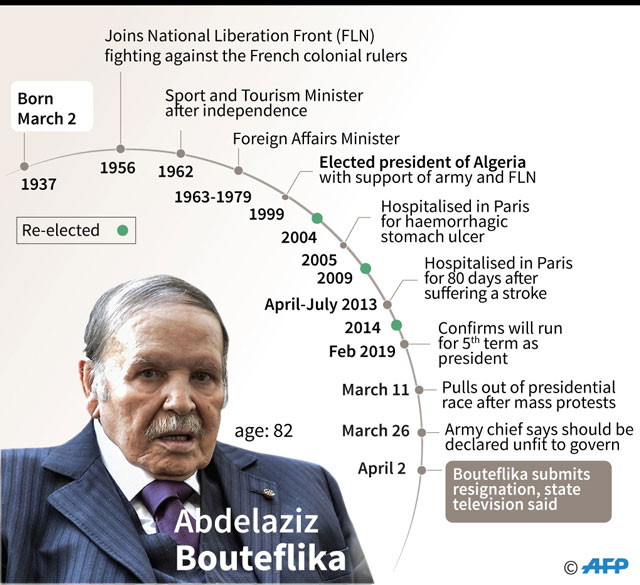
Algiers, Algeria | AFP | Mass protests may have pushed long-time Algerian leader Abdelaziz Bouteflika from power, but demonstrators look unlikely to let up, demanding sweeping changes to the political system.
With pressure far from dissipating, what happens now?
– Constitutional roadmap –
Algeria’s constitution outlines a vague roadmap for political transition.
It stipulates that the speaker of the upper house of parliament, currently 77-year-old Abdelkader Bensalah, should act as interim leader.
The Constitutional Council has noted the presidential “vacancy” and informed parliament, with its two chambers expected to meet soon.
The interim leader has 90 days to organise a presidential election — in two rounds — and hand over power to the winner. He himself is barred from running.
It is a quick turnaround made even trickier by a number of electoral deadlines.
Once a date for the first round of polls is set, electoral hopefuls have 45 days to collect backers and submit their candidacies, which must be validated by the Constitutional Council.
A final run-off between the top two candidates is to be held 15 days after results from the first poll are announced.
– Continued pressure –
Algerians celebrated Bouteflika’s resignation, but protesters have vowed to keep up the pressure, pushing to do away with the deposed leader’s entire elite.
Calls have multiplied on social media for the ouster of key officials nicknamed the “3B”: Bensalah, the prospective interim president, along with Tayeb Belaiz and Noureddine Bedoui.
Belaiz chairs the Constitutional Council, which regulates elections.
Bedoui, appointed prime minister on March 11, served as interior minister for four years and was responsible, among other things, for organising polls the opposition says were fraudulent.
Pure products of the regime, the men have faithfully served Bouteflika since he came to power in 1999.
Protesters say the short deadlines layed out in the constitution make it difficult to amend an electoral code that favours powerful, “established” parties.
Some 20 civil society groups representing a broad swathe of issues have called for continued mass demonstrations Friday to “maintain pressure”, until the “departure of all officials of the regime” and the establishment of transitional institutions.
– At a crossroads –
For Isabelle Werenfels, a research associate at the German Institute for International and Security Affairs, Algeria is at a crossroads.
“The immediate question is whether Algeria will stick to the constitutional process, with elections in 90 days, or whether there will be an effort to negotiate an extra-constitutional outcome,” she said.
For the moment, institutional mechanisms have been set in motion and the government has given symbolic pledges of openness to the press, the opposition and civil society.
Some say Bensalah, a Bouteflika loyalist who frequently stood-in for the ailing leader after the latter suffered a stroke in 2013, may step down and make way for a more “acceptable” replacement.
Others have called for the resignation of the Constitutional Court — the only way to replace its members, who are seen as stalwarts of the Bouteflika era.
Their successors, however, would still need to be appointed by that same system and the interim head of state does not have the constitutional power to reshuffle the government.
Regardless, if the protests do not dwindle, it will be difficult to carry on with the constitutional process as it currently exists.
“One option would be to name an independent and broadly accepted head for a transitional body,” said Werenfels.
But the jury is still out on who might make an acceptable choice for such a position.
– Army’s role –
The key judge will likely be the army, whose intervention was decisive in Bouteflika’s departure.
The military has said it would “support the people until their demands are fully and completely satisfied”.
At the same time, it has insisted it only accepts “a process that guarantees the management of state affairs within the framework of the constitution”.
If mass protests do continue, how will the army react?
“The fears are huge… of a face-off between the street and the military institution,” said Hasni Abidi, who heads the Geneva-based Centre for Arab and Mediterranean Studies.
“There is no counterweight for the army today,” he added.
But the military “is not authorised or trained to handle a delicate transition”, he said, calling to “immediately enter a round of negotiations, which is key to a smooth transition”.
 The Independent Uganda: You get the Truth we Pay the Price
The Independent Uganda: You get the Truth we Pay the Price





